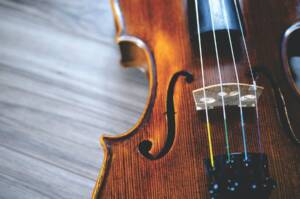The Power of Music Education: How Learning an Instrument Can Change Your Life

Music education is more than just learning how to play an instrument. It has the power to transform individuals and society as a whole. From improved cognitive function to reduced stress, music education offers a wide range of benefits. It can boost academic achievement, build confidence and connection, help individuals cope with trauma and mental health issues, spark creativity and innovation, provide career opportunities, promote cultural appreciation, and contribute to personal growth and self-discovery. The impact of music education is enduring and far-reaching.
The Benefits of Learning an Instrument: From Improved Cognitive Function to Reduced Stress
Learning an instrument can have a profound impact on cognitive function and memory. Numerous studies have shown that individuals who learn to play an instrument have improved executive function skills, such as problem-solving, attention, and multitasking. Playing an instrument requires the brain to process multiple stimuli simultaneously, which strengthens neural connections and enhances cognitive abilities.
In addition to cognitive benefits, learning an instrument can also reduce stress and anxiety levels. Playing music has been found to activate the parasympathetic nervous system, which promotes relaxation and reduces the production of stress hormones. It provides a form of self-expression and emotional release, allowing individuals to channel their feelings into their music. This can be particularly beneficial for individuals who struggle with stress or anxiety disorders.
Music Education and Academic Achievement: How Playing an Instrument Can Boost Grades
Music education has been linked to improved academic achievement. Studies have consistently shown that students who learn an instrument perform better academically than their peers who do not engage in music education. Learning an instrument requires discipline, focus, and time management skills, which are transferable to other areas of academic study.
Playing an instrument also enhances auditory processing skills, which can improve reading comprehension and language development. The ability to read musical notation translates into improved reading skills in general. Furthermore, music education has been found to enhance mathematical abilities, as it involves understanding rhythm, timing, and patterns.
The Social Benefits of Learning an Instrument: Building Confidence and Connection
Learning an instrument can have a profound impact on an individual’s social development. It can build confidence and self-esteem, as individuals gain a sense of accomplishment and mastery over their instrument. Performing in front of others can boost self-confidence and help individuals overcome stage fright or public speaking anxiety.
Music education also provides opportunities for individuals to connect with others and build social skills. Whether it’s playing in a band or orchestra, participating in group lessons, or attending music camps and workshops, music education fosters collaboration, teamwork, and communication. It allows individuals to form meaningful connections with like-minded peers and mentors, creating a sense of belonging and community.
The Emotional Benefits of Music Education: Coping with Trauma and Mental Health
Music has long been recognized as a powerful tool for coping with trauma and mental health issues. It has the ability to evoke emotions and provide a safe outlet for expression. Learning an instrument can provide a healthy way for individuals to process their emotions and improve overall well-being.
Playing an instrument can be a form of therapy, allowing individuals to channel their feelings into their music. It can provide a sense of control and empowerment, as individuals have the ability to create something beautiful out of their emotions. Music education can also help individuals develop emotional intelligence, as they learn to interpret and convey emotions through their playing.
Music Education and Creativity: How Learning an Instrument Can Spark Innovation
Learning an instrument can spark creativity and innovation. Playing music requires individuals to think outside the box and approach problems in new ways. It encourages experimentation, improvisation, and exploration of different musical styles and techniques.
Music education fosters creative thinking by encouraging individuals to compose their own music or interpret existing pieces in unique ways. It allows individuals to express their individuality and develop their own artistic voice. The creative skills developed through music education can be applied to other areas of life, such as problem-solving, critical thinking, and innovation.
The Career Benefits of Music Education: Opportunities in the Music Industry and Beyond
Music education can lead to a variety of career opportunities, both within the music industry and beyond. While some individuals may pursue careers as professional musicians, there are many other paths available. Music education can lead to careers in music production, sound engineering, music therapy, music education, arts administration, and more.
Furthermore, the skills developed through music education are transferable to other fields. Learning an instrument teaches discipline, perseverance, teamwork, communication, and problem-solving skills. These skills are highly valued in a wide range of professions, including business, technology, healthcare, and education.
Music Education and Cultural Appreciation: Connecting with Diverse Communities Through Music
Music education provides individuals with the opportunity to learn about different types of music and connect with diverse communities. By exploring different musical styles and traditions, individuals can gain a deeper appreciation for cultural diversity and develop empathy for others.
Learning about different types of music can also promote cultural understanding and bridge divides between communities. It allows individuals to see the commonalities between different cultures and appreciate the unique contributions each has to offer. Music has the power to bring people together and foster a sense of unity and harmony.
Overcoming Challenges in Music Education: The Importance of Practice and Perseverance
Learning an instrument can be challenging. It requires dedication, practice, and perseverance. However, these challenges teach important life lessons that extend beyond music education. Individuals learn the value of hard work, discipline, and commitment.
Music education also helps individuals develop a growth mindset. They learn that failure is a natural part of the learning process and that mistakes are opportunities for growth. Through practice and perseverance, individuals develop resilience and the ability to overcome obstacles.
The Role of Music Education in Personal Growth and Self-Discovery
Music education plays a crucial role in personal growth and self-discovery. It provides individuals with the opportunity to explore their passions, strengths, and interests. Learning an instrument allows individuals to discover their own unique voice and express themselves in a meaningful way.
Music education can also provide a sense of purpose and fulfillment. It allows individuals to connect with something greater than themselves and make a positive impact on others through their music. Whether it’s performing for an audience, teaching others, or using music as a form of therapy, music education can bring a sense of joy and fulfillment to individuals’ lives.
The Enduring Impact of Music Education on Individuals and Society
In conclusion, music education has the power to transform individuals and society as a whole. It provides numerous benefits, from improved cognitive function to personal growth and self-discovery. Music education enhances academic achievement, builds confidence and connection, helps individuals cope with trauma and mental health issues, sparks creativity and innovation, provides career opportunities, promotes cultural appreciation, and contributes to personal growth and self-discovery. The impact of music education is enduring and far-reaching, making it an essential part of a well-rounded education.





